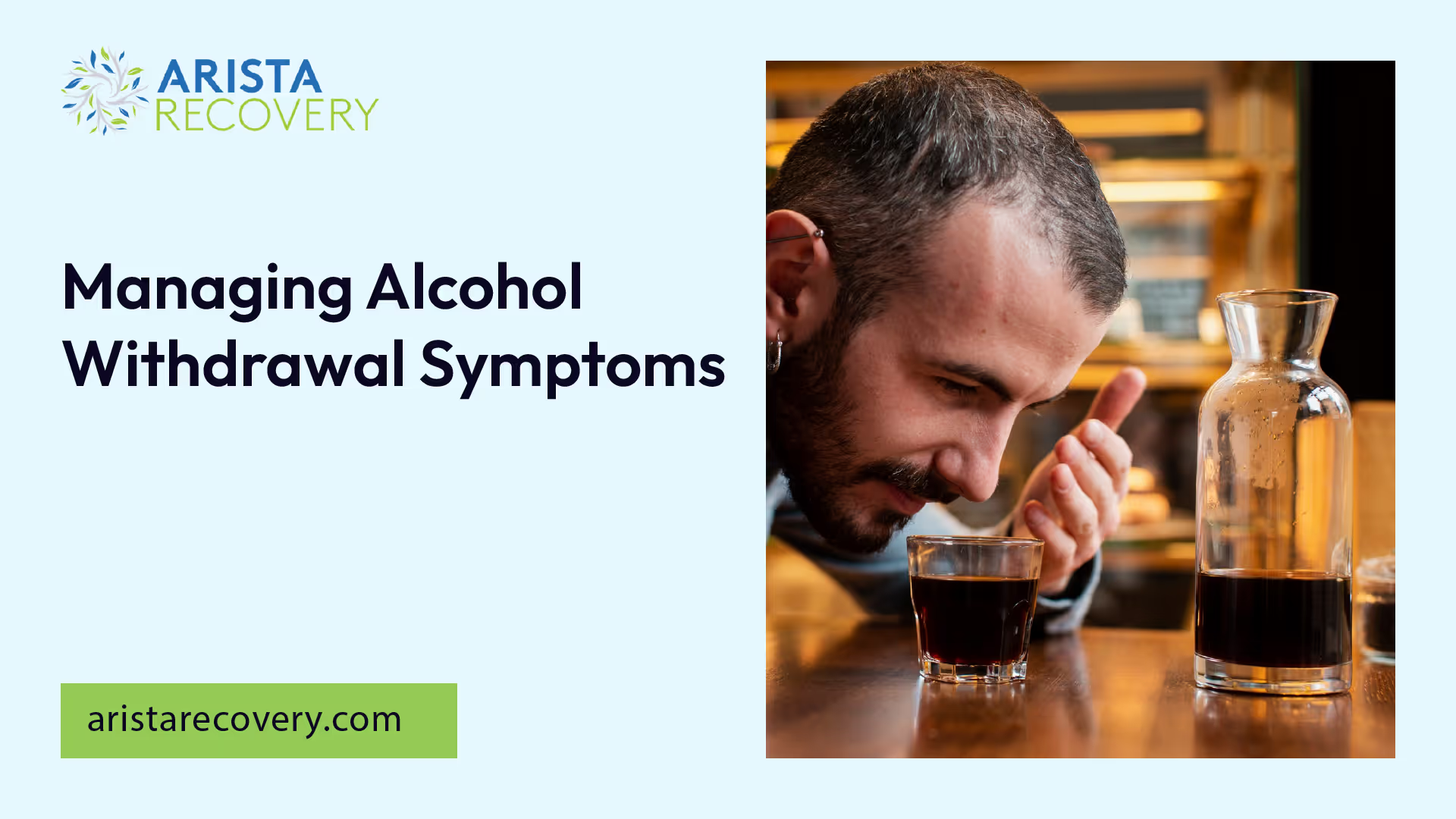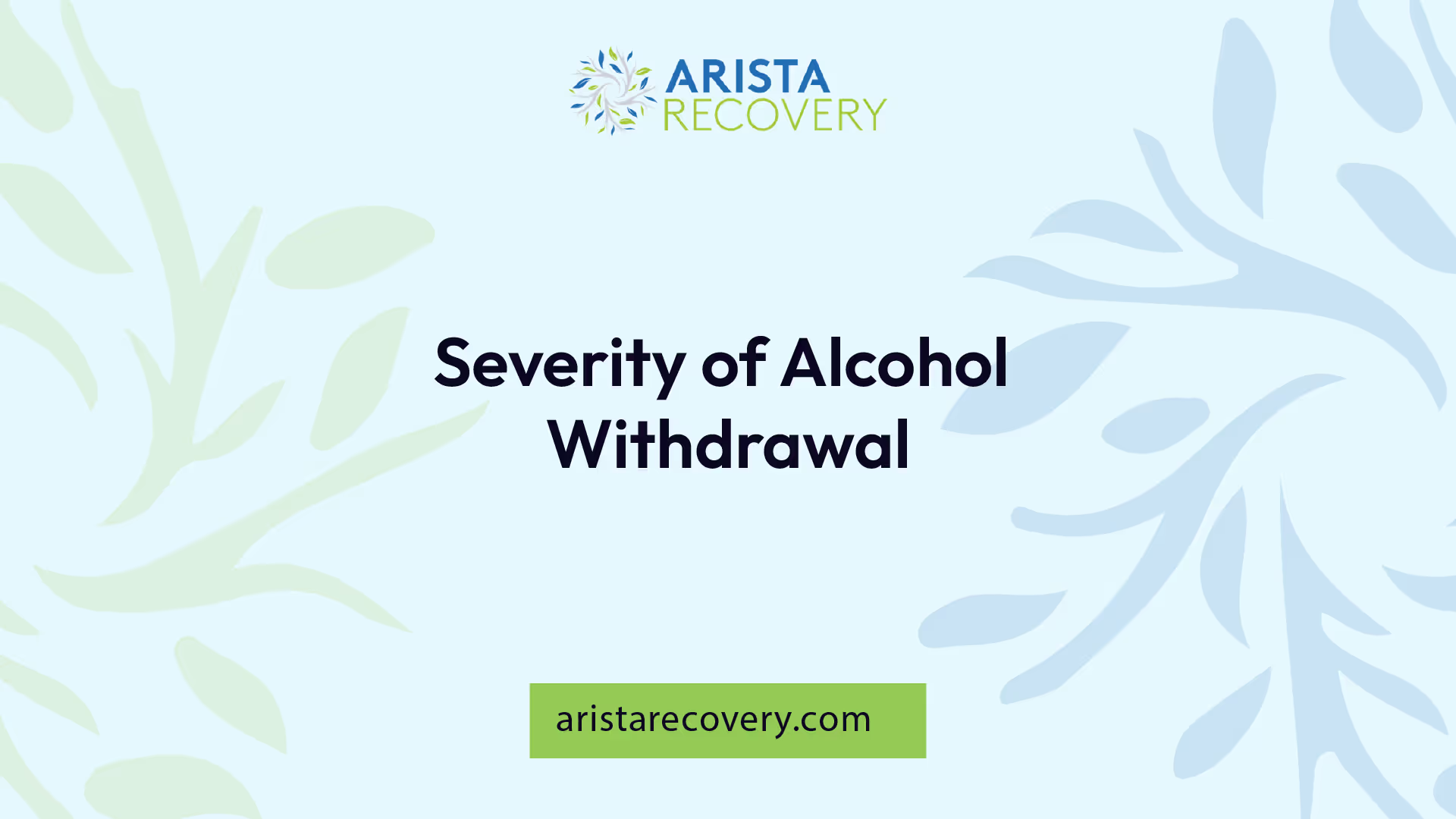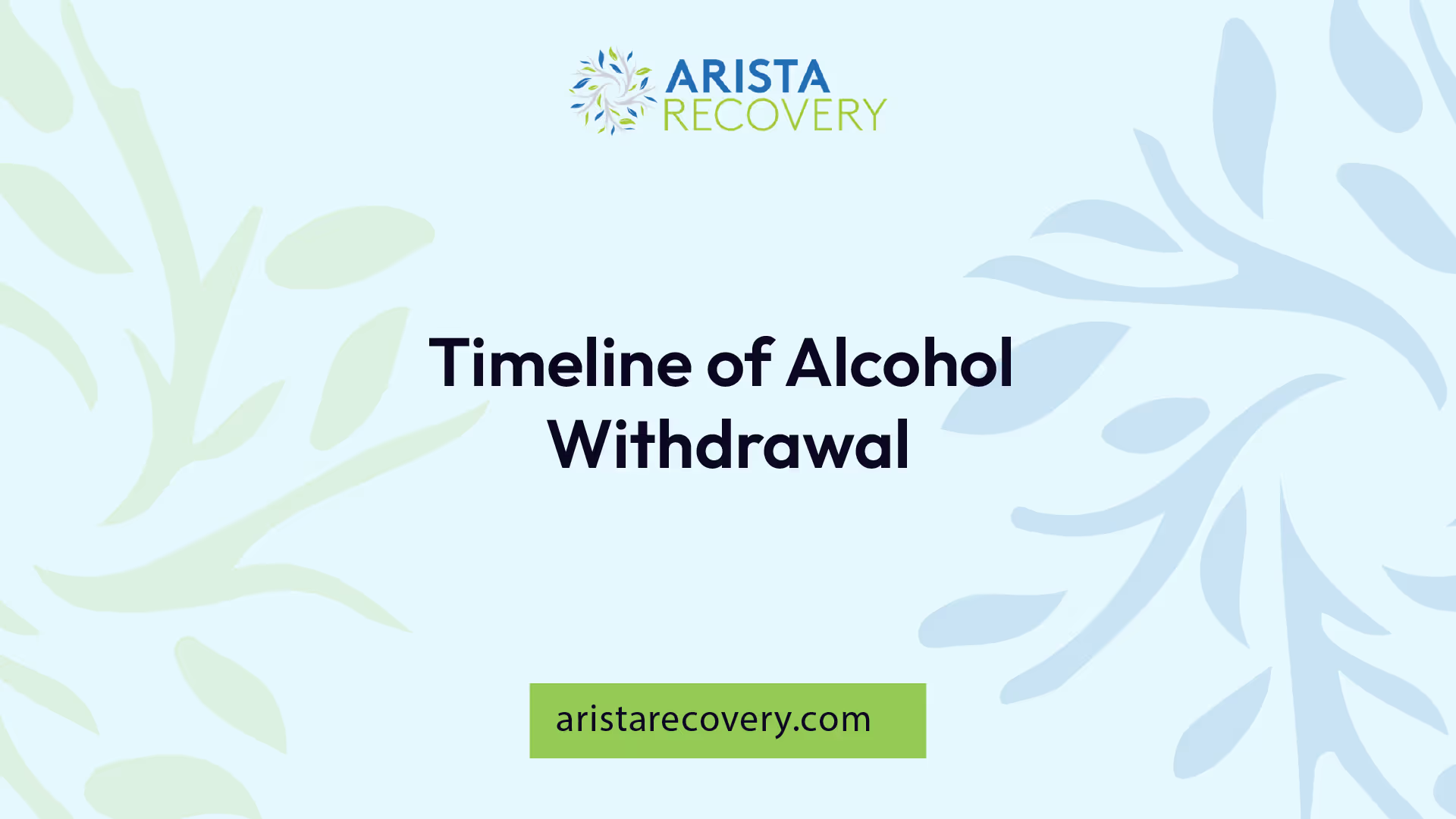Managing Alcohol Withdrawal Symptoms


Understanding Alcohol Withdrawal
Gaining a comprehensive understanding of alcohol withdrawal is key to managing, treating, and ultimately overcoming alcohol use disorder. This process often begins with recognizing the symptoms and understanding the prevalence of this condition.
Alcohol Withdrawal Symptoms
Alcohol withdrawal symptoms can range from mild to severe, and the onset of these symptoms can begin as early as 6 hours after an individual stops drinking. Mild symptoms can include anxiety, tremors, headaches, and nausea. More serious problems, such as hallucinations and seizures, can occur between 12 to 48 hours after the last drink. Delirium tremens, which are severe symptoms including vivid hallucinations and delusions, typically start 48 to 72 hours after stopping drinking, with only about 5% of people experiencing them. More detailed information about delirium tremens symptoms and delirium tremens treatment can be found on our dedicated pages.
The severity and duration of alcohol withdrawal can vary greatly, with some symptoms lasting for weeks or even months. This widely varies depending on factors such as the duration and intensity of alcohol abuse, individual health status, and the presence of co-occurring mental health disorders.
Alcohol Use Disorder Statistics
Alcohol use disorder is the most common substance use disorder in the U.S., affecting 28.8 million adults. Of these individuals, approximately 50% who stop or significantly decrease their alcohol intake will experience alcohol withdrawal.
Data from 2000 showed that 226,000 patients were discharged from short-stay hospitals with diagnoses related to alcohol withdrawal conditions, such as alcohol withdrawal, alcohol withdrawal delirium, or alcohol withdrawal hallucinosis. Despite this, it's estimated that only 10 to 20 percent of patients undergoing alcohol withdrawal are treated as inpatients. This suggests that up to 2 million Americans may experience symptoms of alcohol withdrawal conditions each year [3].
Understanding alcohol withdrawal symptoms and the statistics related to alcohol use disorder is crucial in recognizing the scope of this issue. This knowledge is a vital step in the journey towards recovery, whether that's an individual's personal journey or the collective effort to address this widespread public health concern. For more information on specific types of alcohol withdrawal such as severe alcohol withdrawal or acute alcohol withdrawal, visit our dedicated pages.

Severity of Alcohol Withdrawal
Alcohol withdrawal affects about 50% of people with alcohol use disorder who stop or significantly decrease their alcohol intake, making it a common but critical health concern. Symptoms of alcohol withdrawal can range from mild to severe, and in some cases, life-threatening. Understanding the severity and timeline of these symptoms can be crucial in managing and treating alcohol withdrawal.
Mild Symptoms
Mild symptoms of alcohol withdrawal typically begin within six to 24 hours of stopping or significantly decreasing heavy, long-term alcohol use. These symptoms can include anxiety, shaky hands, headache, nausea, vomiting, insomnia, and sweating. While these symptoms may be uncomfortable, they are less dangerous than severe symptoms. However, any individual experiencing alcohol withdrawal should seek medical attention, as symptoms can rapidly escalate.
Severe Symptoms
Severe symptoms of alcohol withdrawal, such as hallucinations and seizures, tend to occur 12-48 hours after the last drink [1]. These symptoms can be dangerous and may require hospitalization for treatment. More than 90 percent of alcohol withdrawal seizures occur within 48 hours after the patient stops drinking, with a few seizures occurring 5 to 20 days after the last drink. For more information about severe alcohol withdrawal, visit our article on severe alcohol withdrawal.
Delirium Tremens
Delirium Tremens (DT's) is a severe form of alcohol withdrawal that usually starts 48-72 hours after stopping drinking. Only about 5% of people experience them, but it can be life-threatening, with about 5% to 10% of people with this complication dying from it [2]. Symptoms of DT's can include severe confusion, seizures, high blood pressure, and hallucinations. Women experiencing DT's may exhibit autonomic symptoms less frequently than men, and co-occurring medical problems can complicate the diagnosis and treatment of DT's. To learn more about delirium tremens, visit our articles on delirium tremens symptoms and delirium tremens treatment.
Understanding the severity of alcohol withdrawal symptoms is essential to ensure proper treatment and care. Whether symptoms are mild or severe, professional medical help should be sought to manage withdrawal and reduce the risk of complications.

Timeline of Alcohol Withdrawal
Understanding the timeline of alcohol withdrawal can assist in preparing for the process and knowing what to expect. The timeline can vary depending on the individual's history of alcohol consumption, overall health, and other factors. However, there are common patterns in how symptoms of alcohol withdrawal develop and resolve.
Onset of Symptoms
Alcohol withdrawal symptoms can range from mild to serious, with mild symptoms starting as early as 6 hours after stopping drinking. More serious problems like hallucinations and seizures may occur 12-48 hours after the last drink. Symptoms of alcohol withdrawal typically begin within six to 24 hours of stopping or significantly decreasing heavy, long-term alcohol use.
Peak Symptoms
Alcohol withdrawal symptoms tend to peak 24 to 72 hours after the last drink, but some symptoms may persist for weeks. Delirium tremens, which are severe symptoms including vivid hallucinations and delusions, usually start 48-72 hours after stopping drinking, with only about 5% of people experiencing them [1]. To learn more about delirium tremens, including symptoms and treatment options, visit our articles on delirium tremens symptoms and delirium tremens treatment.
Duration of Symptoms
The severity and length of alcohol withdrawal can vary, with some symptoms lasting for weeks or months [2]. More than 90 percent of alcohol withdrawal seizures occur within 48 hours after the patient stops drinking, with a few seizures occurring 5 to 20 days after the last drink. Some symptoms may start a few hours or days after the last drink of alcohol and can range from minor symptoms like insomnia and tremulousness to severe complications such as withdrawal seizures and delirium tremens.
Understanding the timeline of alcohol withdrawal symptoms can provide a roadmap for individuals navigating recovery and their support networks. It's essential to recognize the signs of severe alcohol withdrawal and seek medical help when necessary. The journey through withdrawal is a critical step in overcoming alcohol use disorder and moving towards a healthier life.
Treatment for Alcohol Withdrawal
Addressing alcohol withdrawal symptoms requires a multi-pronged approach that often involves hospitalization, medication, and supportive care.
Hospitalization
Severe and complicated alcohol withdrawal may necessitate treatment in a hospital, sometimes in the Intensive Care Unit (ICU). The main management for severe symptoms includes the use of long-acting benzodiazepines like IV diazepam or IV lorazepam. In some circumstances, especially during severe alcohol withdrawal or delirium tremens, medical supervision provides the safest environment for recovery.
Medications for Withdrawal
Benzodiazepines (benzos) are the first-choice medications for treating alcohol withdrawal symptoms. They imitate the effects of alcohol in the brain, aiding in the prevention of withdrawal symptoms. Long-acting benzos are preferred for a smoother treatment course, with commonly prescribed ones including Chlordiazepoxide (Librium), Diazepam (Valium), Lorazepam (Ativan), and Oxazepam (Serax) [5].
In cases of severe alcohol withdrawal syndrome (AWS) where benzos alone are not fully effective, barbiturates (usually phenobarbital) and propofol can be used. These are typically used for anesthesia and can help with seizures and severe agitation [5].
Carbamazepine has been identified as an effective alternative to benzodiazepines in treating alcohol withdrawal syndrome in patients with mild to moderate symptoms.
Supportive Care
Supportive care is pivotal in treating AWS. It includes IV fluids for dehydration, glucose-containing fluids for malnourishment, electrolyte replacements, and vitamin supplementation.
Outpatient management of AWS is possible in mild cases with low risk for severe symptoms. Here, benzodiazepines are prescribed for about four days along with multivitamins and supportive programs.
To ensure the best outcome during alcohol withdrawal, it is recommended to consult with a doctor or drug treatment specialist about what to expect during alcohol withdrawal and whether any medications may help in the process.
Management of alcohol withdrawal symptoms is a complex process that requires a combination of hospitalization, medication, and supportive care. The goal is to ensure the safety and well-being of the individual during this challenging time. It is important to remember that seeking professional help for delirium tremens treatment and severe alcohol withdrawal is crucial for recovery.
Complications of Alcohol Withdrawal
Alcohol withdrawal symptoms may range from mild to severe, but in some unfortunate cases, they can turn into dangerous complications. These may include alcohol withdrawal seizures, Wernicke-Korsakoff syndrome, and cardiovascular complications.
Alcohol Withdrawal Seizures
Seizures may occur in more than 5 percent of untreated patients going through acute alcohol withdrawal, with the majority of these seizures occurring within 48 hours after the cessation of alcohol consumption. However, it's worth noting that a few seizures could happen 5 to 20 days after the last drink.
The likelihood and severity of withdrawal seizures increase with the number of past withdrawals, pointing to cumulative long-term changes in brain excitability. If you or someone you know is experiencing symptoms of severe alcohol withdrawal, which may include seizures, seek professional medical help immediately.
Wernicke-Korsakoff Syndrome
Wernicke-Korsakoff syndrome is not a complication of acute alcohol withdrawal per se but usually occurs during this period. Wernicke's syndrome is characterized by severe cognitive impairment, delirium, abnormal gait, and paralysis of certain eye muscles. Korsakoff's syndrome, which affects approximately 80 percent of patients recovering from Wernicke's syndrome, involves severe amnesia and impaired memory.
Even though Wernicke-Korsakoff syndrome might not directly result from the withdrawal process, it's crucial to be aware of the syndrome's symptoms due to its high prevalence during this period. You can learn more about these conditions and their treatment on our page about delirium tremens treatment.
Cardiovascular Complications
Cardiovascular complications may also arise as a result of alcohol withdrawal. These complications might include elevated heart rate and blood pressure, which, if not managed well, could lead to further complications.
It's crucial to understand that alcohol withdrawal symptoms can vary in severity and can potentially be life-threatening if not managed properly. Therefore, it is advised to seek professional medical help when dealing with acute alcohol withdrawal.
In conclusion, recognizing the signs of alcohol withdrawal and seeking immediate medical help can prevent these complications. It's also essential to have a strong support system and make lifestyle changes to prevent relapse and ensure a successful recovery.
Managing Alcohol Withdrawal
Successfully navigating through alcohol withdrawal requires a comprehensive approach that addresses the physical, psychological, and social aspects of recovery. Below, we'll explore the importance of support systems, lifestyle changes, and relapse prevention in managing alcohol withdrawal symptoms.
Support Systems
During the challenging phase of alcohol withdrawal, having a robust support system is crucial. Emotional support from trusted family members or friends can provide a much-needed sense of stability and reassurance. They can help challenge any negative thoughts and offer encouragement during the recovery process [6].
Joining a support group, such as Alcoholics Anonymous, can also be beneficial. It provides an opportunity to connect with others who are going through similar experiences and understand the struggles associated with alcohol withdrawal.
Lifestyle Changes
Making certain lifestyle adjustments is equally important for managing alcohol withdrawal symptoms. This includes managing stress, taking care of one's health by eating nutritious foods, exercising regularly, and getting adequate sleep. In addition, staying hydrated and keeping oneself distracted can help control cravings and reduce symptoms.
In some cases, alcohol withdrawal syndrome may be severe enough to require medical treatment at a hospital or rehabilitation facility. In these situations, supportive care, including IV fluids for dehydration and electrolyte replacements, is crucial.
Relapse Prevention
Relapse is a common part of the recovery journey, but there are strategies to prevent or manage it. Removing all alcohol from the home, avoiding triggers, and making a plan in case of relapse are essential steps to support recovery from alcohol withdrawal.
It's recommended to have a strategy in place to prevent relapses, and seek support from loved ones or therapists. This might be particularly necessary for individuals dealing with severe symptoms such as delirium tremens.
Whether dealing with acute alcohol withdrawal or severe alcohol withdrawal, it's important to remember that help is available. The journey may be difficult, but with the right support and resources, recovery is possible.
References
[1]: https://www.webmd.com/mental-health/addiction/alcohol-withdrawal-symptoms-treatments
[2]: https://my.clevelandclinic.org/health/diseases/alcohol-withdrawal
[3]: https://www.aafp.org/pubs/afp/issues/2004/0315/p1443.html
[4]: https://www.ncbi.nlm.nih.gov/pmc/articles/PMC6761825/
[5]: https://www.goodrx.com/conditions/alcohol-use-disorder/alcohol-withdrawal-medication
[6]: https://www.webmd.com/mental-health/addiction/alcohol-withdrawal
Support that moves with you.
You’ve taken a brave first step. At Arista Recovery, we’re here to help you continue with best-in-class care designed for long-term healing and support.
You’re not alone in this.
When mental health challenges and addiction intersect, it can feel isolating. At Arista, we offer compassionate, evidence-based, and trauma-informed care to help you heal, grow, and move forward.








